A VOICE FOR THE VOICELESS

October is Domestic Violence Awareness Month, and the Northwest Missourian is dedicating its first issue of the month directly to spreading awareness. We strictly covered news relating to domestic violence within our community as well as reopening the “Letters From” Project.
Domestic violence affects more people than we realize. On any given day, there is a high probability that you may have crossed paths with a survivor of domestic violence. One in three women and one in four men have experienced some form of violence from an intimate partner.
Domestic violence is a well-known subject, but it is rarely talked about. There are people who live their daily lives not realizing they have been in a violent domestic relationship. Domestic violence is not just physical, it is emotional, mental, financial and sexual.
People of all ages, sexes, races, incomes, religions, cultures or any other defining demographics have been affected by domestic violence. It doesn’t discriminate and may be affecting the closest people in our lives without knowing.
The Editorial Board believes it is not only important, but it is imperative to understand the severity of the subject. With our given platform, we knew it was a responsibility of ours to reach to our audience in many ways — starting with the survivors.
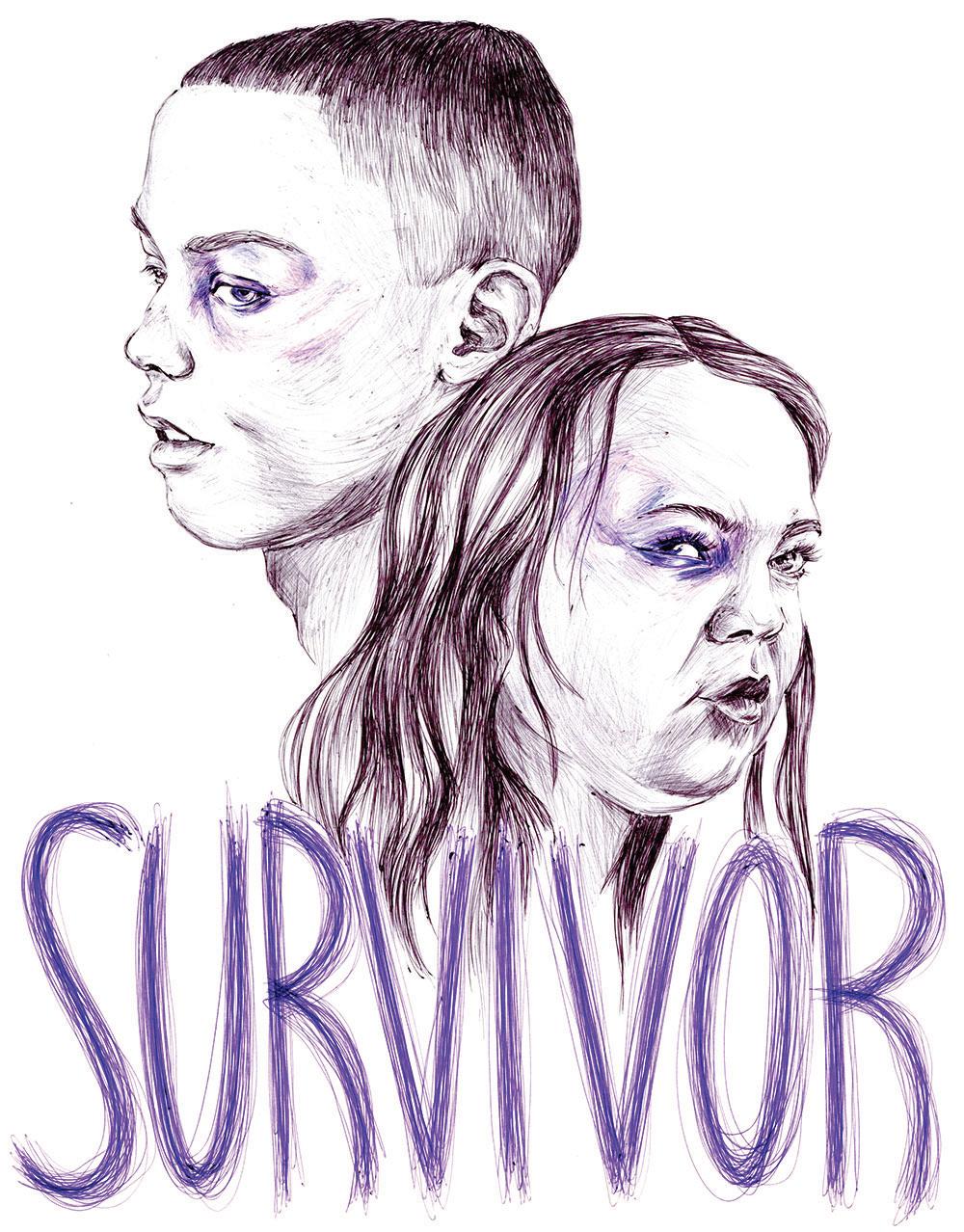


For some survivors, their voice has been muted, turned away and shut down. This is the sad reality of the world that we live in today, but we wanted to make a change to this. We decided to allow those in our community to have their voice heard by submitting anonymous letters of their experiences to be published in this week’s edition of the Northwest Missourian.

We didn’t want to stop there, the Editorial Board realizes that as a smaller community, the resources and awareness to this subject is limited. With that in mind, we also wanted to call attention to this subject within our news stories.

The Editorial Board of the Northwest Missourian stands with not only the survivors, but the current victims as well, of domestic violence. We encourage those who are or have been in danger to speak up and reach out to the local resources.

PLEASE RECYCLE AN INDEPENDENT STUDENT NEWSPAPER SINCE 1914. THURSDAY, OCTOBER 6, 2022 MARYVILLE, MISSOURI NWMISSOURINEWS.COM VOL. 111, NO. 8 @THEMISSOURIAN SPECIAL ISSUE: DOMESTIC VIOLENCE AWARENESS MONTH Northwest Missouri’s oldest and largest independently-owned and operated bank. Maryville 660-562-3232 St. Joseph 816-364-5678 Savannah 816-324-3158 Mound City 660-442-3131 Member FDIC Smithville 816-873-2929 Platte City 816-597-5300
ALEXANDREA MESZ CARTOONIST
Survivors share stories, hope through shirts for It’s On Us Clothesline Project
In a 2011 study among college students, 42% of students who experienced abuse said they didn’t tell anyone. All students hear stories about it, but they are rarely taught how to deal with or tell if they are in the state of a violent relationship.
It’s On Us will be hosting its annual Clothesline Project for survivors from Oct. 7-14. The survivors will be able to share their stories and hang up the clothes that were worn in the events of violence.
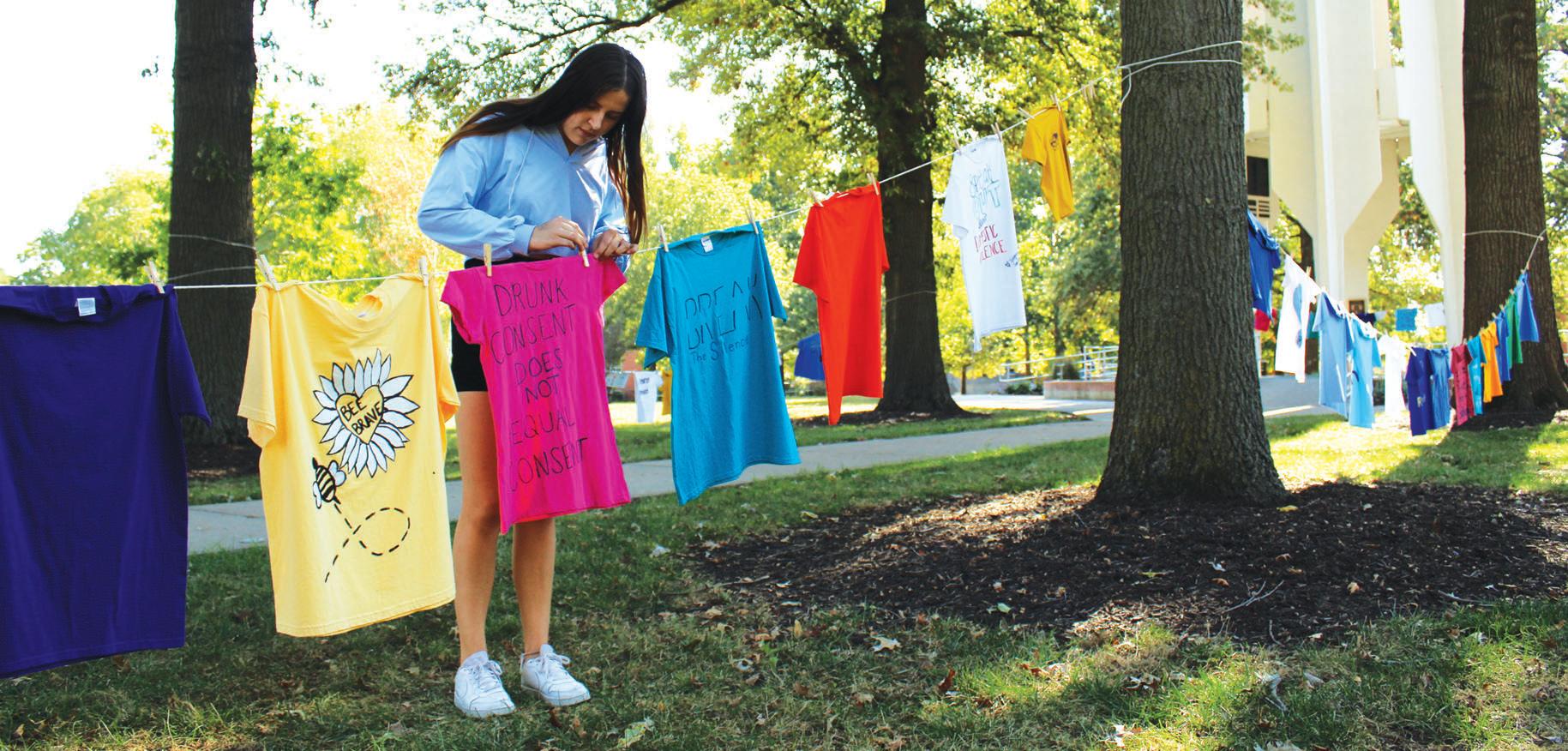
It’s On Us is a local chapter of the national nonprofit organization that specializes in violence prevention. It meets every other Thursday at 4 p.m. in the First Family Dining Room in the J.W. Jones Student Union.
The organization was founded in September 2014 as an initiative of the Obama-Biden Administration. It allowed schools to start chapters on campus to help prevent, learn and provide resources and support for survivors. This organization has grown into one of the largest programs dedicated to college sexual assault prevention and survivor support.
Madelyn Cline is the secretary of It’s On Us and has been a part of the organization for two years.
“I would say I have learned a lot from this organization. I have learned that there are a lot
of things that I would’ve never thought about myself until it happens to someone you care about,” Cline said. “There is a lot people that will say ‘I will do this this and this immediately,’ but you get into your fight or flight mode and most of the time people flight or they freeze.”
October is Domestic Violence Awareness Month, and the organization has started the month with Sex in the Station. This event gives peers the opportunity to learn and ask questions about consent, safe sex and the hard topics of violence.
Clothes will be hung up by the Memorial Bell Tower, and students can stop and view and read about the feelings they felt during the event or after. Last year’s shirts had a variety of different inspirational words written on them. Shirts were scattered with poems and messages from survivors, like “Drunk consent does not equal consent.” These messages will be written across different colored shirts that represent different types of domestic violence.
White shirts are in memory of people who have died due to violence. Yellow or beige correspond with battered or assaulted victims. Red, pink or orange are for survivors of rape and sexual assault.
Blue or green represents survivors of incest or child sexual violence. Purple or lavender exemplifies people attacked because of their gender identity



or sexual orientation. Black is for people who are permanently disabled as a result of violence or who were abused because they are disabled.
“The simple recognition from an organization on campus allows the safety for people to feel like ‘oh, this isn’t just me, I’m not the only one dealing with this here on campus,’” Cline said.
According to Rainn, 54% of sexual violence survivors are between the ages of 18-34.
Courtney Rowe, the president of It’s On Us, said it’s important to her to have an organization here at Northwest that gives survivors the opportunity to share
and reclaim what has happened to them. She said she wants to make awareness of these issues prevalent on campus and make it known that this happens on campus and to college students.
“We give people the opportunity to share their story in the form of art. I think that’s really powerful,” Rowe said. “It allows people to kind of reclaim in a way what happened to them and share their story and get their voices back from a time where they felt like it had been taken away completely.”
The organization encourages people to join in Engage Training Oct. 9 from 2-3:30 p.m. This training is a multi-level violence
prevention strategy to reduce harm on campus related to drug use, alcohol use, discrimination and much more that play a big role in violence.
It’s On Us consistently looks for ways to expand its impact and help prevent violence on campus. It offers service work for students and hopes to bring in speakers to talk about sex trafficking, domestic and sexual violence.
“At the end of the day, if you stay silent, you are being compliant in the problem and talking about it, raising awareness, that is the first step. We are always looking for ways to expand that impact,” Rowe said.
Iowa, St. Joseph offers more resources to violence survivors
North Star Advocacy Center is a local resource for anyone going through domestic violence, whether it be physical, sexual,
emotional or financial abuse.
But it’s not the only nearby resource for anyone going through any of those things. There’s the University’s Wellness Services, the Young Women’s Christian
Association and Southwest Iowa Families Inc.




To the north is the Southwest Iowa Families, a mental health service based in Clarinda, Iowa. Southwest Iowa Families has
Bearcats Got Game

been serving children and their families for 27 years. It serves foster children, at-risk children and anyone else in southern Iowa. Its staff is specifically trained in mental health services and trauma focused behavioral therapy for children. Its mission is to “enhance the lives of children and their families in southwest Iowa.”
In 2019, Southwest Iowa Families served over 1,000 individuals in counseling over 5,098 hours. It provides southwest Iowa and northwest Missouri with abuse prevention services, helping children’s behavior in school improve and others.
The YWCA sits just off North Eighth Street and Jules Street in St. Joseph, just 45 minutes down the road. The YWCA’s mission is to eliminate racism and empower women and thus get a lot of domestic abuse victims walking through its doors.
The St. Joseph YWCA has been in operation since 1888 and is one of the two within the state of Missouri. The YWCA offers shelter, counseling, housing services and outreach to victims and survivors of domestic and sexual abuse, helping women, men and children. It also provides teen programming, a childcare center and a teenage parent program. Last year, the St. Joseph location served over 1,600 women and children, from sheltering, counseling and other programs. The YWCA also answered 1,480 hotline calls in 2021.
Traci McChristy is the YWCA’s volunteer and outreach director and has worked with the St. Joseph location for 16 years. Originally starting off in the organization’s teenage parent program, McChristy said that over the years she’s learned a lot about domestic violence, such as why women often return to their abusers.
“It could be economic, they could be scared because they don’t want anything to happen to that pet that they have to leave
behind, they worry about uprooting their kids and changing what they’re used to – their schedules, their routines,” McChristy said. “So there’s just so many reasons why a person doesn’t leave a domestic violence situation.”
All of the YWCA’s domestic violence advocates have been trained to help the abused create a safety plan for when they plan to leave their abusive partner or situation once and for all.
“That moment when they decide that they are leaving for good is the most dangerous time for them,” McChristy said. “So it’s important to have that safety plan in place.”
Another great resource for the abused is right here in town, the University Wellness Center. Wellness Services offers all kinds of counseling for anyone in any situation. Wellness Services offer traditional counseling, peer wellness coaching and for the emergencies, a crisis service, where students, faculty and staff can meet with a triage counselor at the Wellness Center during business hours or a 24-hour support line at (888) 279-8188. Scheduling a session with a Wellness Services counselor just takes a phone call..
On average, it takes women seven attempts to leave an abusive relationship. Over the years, McChristy has seen some of the same people walk into the YWCA’s doors more than once.
“When someone has been here, and they’ve gone back to their abuser, and they come here again, we treat them like it’s the first time,” McChristy said. “We don’t judge. Because we don’t know the reasoning, so we have to keep that in mind.”
The St. Joseph YWCA has continuously served over 500 women a year and have given shelter to those in need for over 16,000 nights. Its facility is located at 304 N. Eighth street. To call its crisis hotline, call 800653-1477.
A2 SPECIAL ISSUE Oct. 6, 2022 @TheMissourian PITZENBERGER Body Shop Shop monday - friday 7am to 5pm(660) 582-4599 “we take the dents out of accidents” S ince 1985 Since 1985 2711 S MULBERRY ST. MARYVILLE, MO t-shirt design t-shirt scan to buy a t-shirt scan to a t-shirt scan for parade scan for registration @nwhomecoming
10/17 10/20 10/22 10/22
ALYNA THIBAULT Missourian Reporter | @TheMissourian
JAKOB PRATER News Editor | @JakobLPrater
FILE
A Northwest student helps set up the Clothesline Project put on by It’s On Us. This year’s project, which is Oct. 7-14, gives survivors an opportunity to share their stories while hanging up clothes they were wearing at the time.
A BRIGHT LIGHT A
North Star: Helping domestic violence and sexual assault survivors one









at a time
A pale yellow house sits near the end of Second Street. This quaint looking house is the home of an organization that has done a lot for people in the Maryville community and beyond – the North Star Advocacy Center.
North Star is an organization that specializes in providing services to survivors of domestic and sexual violence. Its services are provided for victims and survivors in Nodaway, Gentry, Atchison, Holt and Worth counties. The mission of the advocacy center as stated on its website, is validating and empowering victims of domestic and sexual violence while working to influence a cultural change.
North Star was established in July 2002 under the original name “The Children and Family Center of Northwest Missouri.” The organization has continued to evolve by expanding its services throughout the two decades it has been serving members of nearby counties.
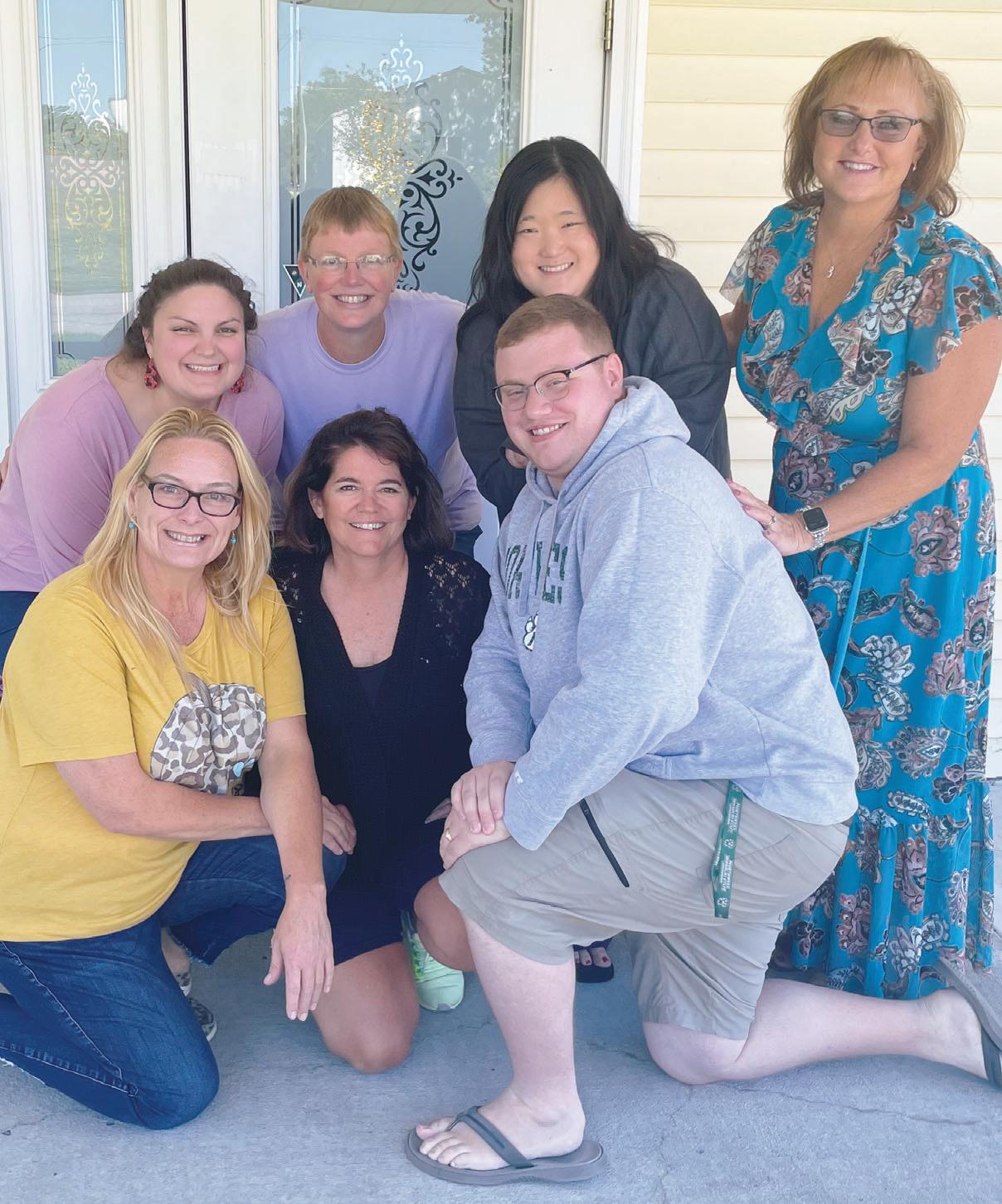
It assists with multiple aspects of domestic violence and sexual assault. Some examples are hospital and medical advocacy, court advocacy, a 24-hour crisis phone to reach a member of the North Star team, 24-hour shelter for survivors who need it and many more services. All of the services provided by the advocacy center are confidential and free of charge.


In 2021, it served a total of 321 clients with these various direct services, which consisted of 263 females, 21 males and 37 children. The advocacy center also received $35,294 in donated items during 2021.
Linda Mattson has been the executive director of the advocacy center since 2016. Mattson said that even though she is the director, she doesn’t feel much pressure in the job. The one thing she said she does feel pressure about sometimes is advertising the advocacy cen-
ter to the community.
“I feel that we’re always looking for ways to reach more victims,” Mattson said. “In that way, I feel pressure to get the word out about our services. Because it seems like no matter what we do, people still don’t know we’re here. I just want the word to get out.”
Court/Victim Advocate Meghann Kosman said most people assume the advocacy center is just a shelter for domestic violence survivors. Because of this, they think they have to stay in the shelter in order to receive the services provided, which is not the case, and many of them aren’t aware of the other services that are provided by the advocacy center.
“Once we call ourselves a domestic, sexual violence shelter, a lot of people will just dismiss and think ‘well I don’t need that service’ and then that leaves them unaware of the other services that we provide,” Kosman said. “I want people to know that those services are available too, not just the shelter.”
North Star is an organization that means many different things to the people who are a part of it. Mattson said for her North Star is a place where people can come and not be judged, and it’s a place where domestic violence survivors are given their control and power back.
Kosman said for her, North Star is a place where survivors can come to be believed and validated. Court Advocate Wyatt Williams said for him, North Star is a way to improve all five counties it serves, and a tool that can be used for good in the community. On-call Victim Advocate Julia Day said for her, North Star is exactly like the star that it’s named after, a guiding light in the darkness of domestic violence and sexual assault.
“Being in a domestic violence relationship or having been sexually assaulted can feel like living in the darkness,” Day said in an email to The Missouri-


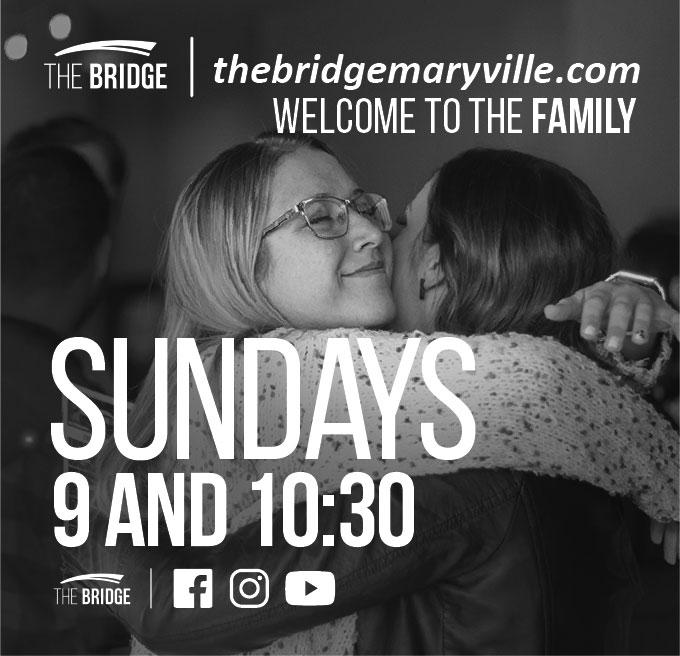
an. “You feel so alone and as though no one can see you. You have nothing but the darkness, or abuse, surrounding you. The staff at North Star are meant to be a light to people who are quite literally stuck in the cycle.” Mattson wanted people in the community to know North Star is there to help people always, no matter what the specific situation they are experiencing may entail.
“My team here will work and do whatever they need to to help,” Mattson said. “There are a lot of similarities to every situation, but every situation is unique. We really work hard to do whatever we can to help you with your unique situation.”
Day said North Star and the work it does in the community doesn’t just assist those who are experiencing physically abusive relationships.
“Domestic violence is not just physical,” Day said in an email to The Missourian. “It includes emotional abuse. So many people go without help because of the thought ‘well, they’ve never hit me,’ but emotional abuse is domestic violence and can leave scars that will last longer than physical violence.”

Court Advocate Wyatt Williams said he wanted people in the community to know that North Star is not just an advocacy center for women, and it is open to anyone who has experienced domestic violence or sexual assault that is in need of assistance.
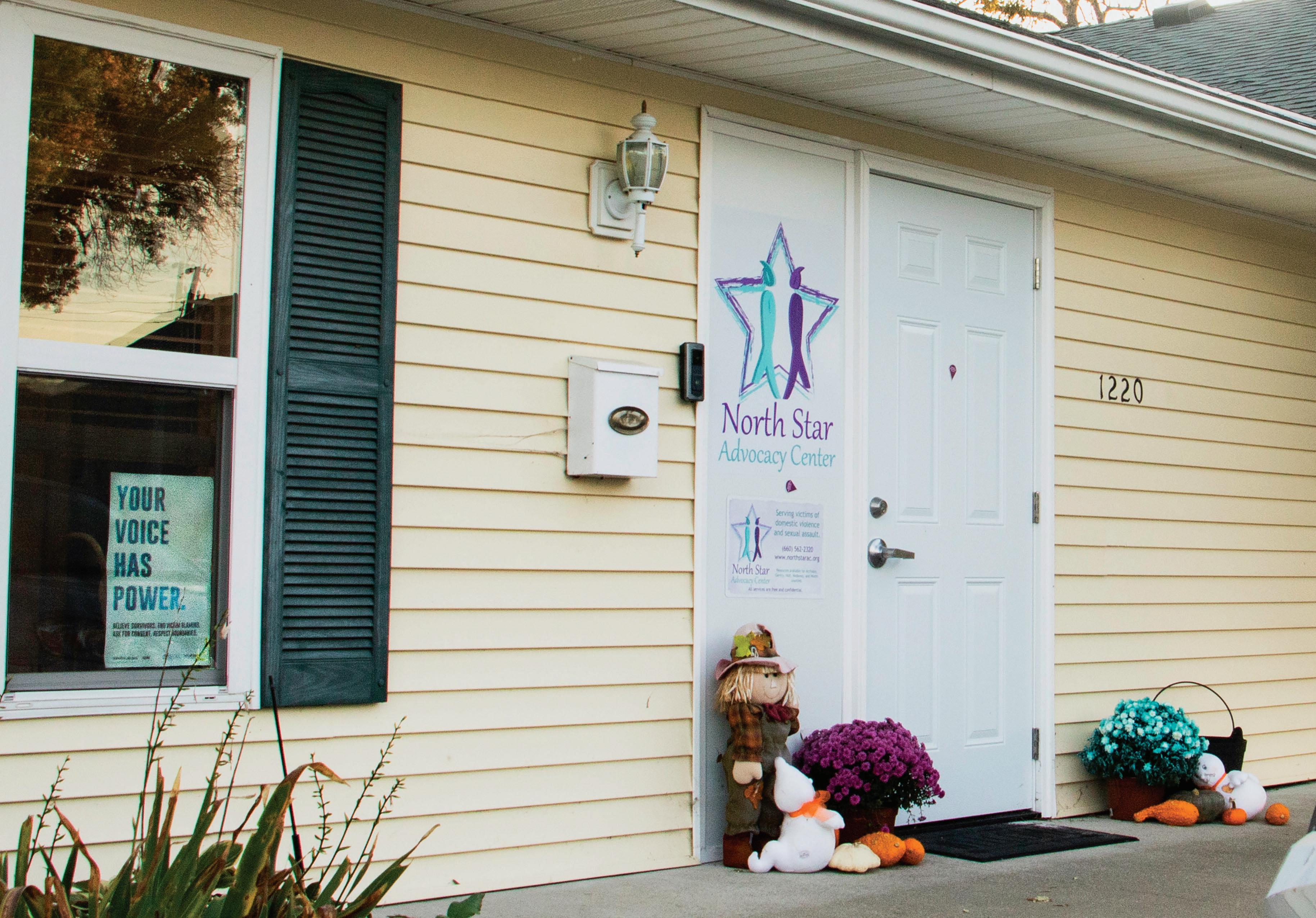
“We get the misconception that it’s a women’s shelter only, but that’s not true,” Williams said. “We know that this kind of crime doesn’t discriminate. We want to be the best for everybody.”
Mattson said she hopes North Star can help educate Maryville community members and community members of nearby cities about how much a problem domestic abuse and sexual assault really is.
“I think it’s something that the general public is still very unaware of,'' Mattson said.







“Somebody they know is affected by this. We just want to keep working to reach people and let them know we’re here for them if they need it.”
Mattson said although there is a lot of work to do regarding educating people in the community, there are some community members who are very supportive of North Star and the work it does. She said that their support means a lot, and the advocacy center wouldn’t be there without the support.
Another big part of North Star is its volunteers and interns. Day said that volunteers are invaluable to North Star and its work.
“We love our volunteers and
so many things that we do for clients could not be done without them,” Day said in an email to the Missourian. “Something as simple as coming to the shelter to watch a client’s child while that client is in a counseling session can immensely help the wellbeing and trajectory for a client.”

















































































Northwest students who have interest in volunteering at North Star must be at least 18 years old to do so, and they must pass a background check and go through training before becoming a volunteer. For students who are interested in learning more about becoming a volunteer for North Star, email Kosman at advocate1@ northstarac.org

Oct. 6, 2022 A3 @TheMissourian SPECIAL ISSUE FEEDyD FAITH Hworshipinmaryv A T I F worship w worsh maryv m in n ille le l v First Christian Church Disciples of Christ www.fccmaryvillemo.com fccmaryvillemo@gmail.com Service e Sunday - 10:30 AM Bible Study Monday - 10 AM Prayer & Share (rm 106) Last Supper Leftovers (Fellowship Hall) room 106 Campus Contact Where Life... Meets Love Deena Poynter 660.541.1336 Rev. Lem Whitmer 816.695.3002 201 W 3rd St 660.214.3414 Sunday - 9 AM Everyone Is Welcome Here CORNERS OF 1ST & MAIN, MARYVILLE, MO 1st and Main Street | 660-582-4821 FIRST UNITED METHODIST CHURCH MARYVILLEFUMC.ORG JOIN US FOR WORSHIP SUNDAYS AT 9 AND 11 AM FumcMaryville ST T St. Gregory Barbarigo Catholic Church 333 South Davis St www.stgregorysmaryville.org Mass Times Saturday Sunday Sunday 5:00pm 8:00am 10:30am weekends Monday Wednesday Thursday Friday 12:00pm 8:00am 8:00am 8:00am weekdays In the middle of East Second Street sits North Star Advocacy Center, which is preparing for the turning of the seasons with fall decorations on its front porch. The North Star Advocacy Center welcomes victims of sexual and domestic violence with open arms and offers victim advocate services to those in need. NATHAN SMITH PHOTOGRAPHER
day
KENNEDY KALVODA News Reporter | @Kkalvoda1
SUBMITTED
The North Star team poses in front of its 20 bed shelter at 1220 E. Second St. Front: Sherry Brown, Krista VonBehren, Wyatt Williams. Back: Julia Day, Linda Mattson, Meghann Kosman, Cindy Lemar.
Missouri courts protect domestic violence victims
KIERSTEN HELM Missourian Reporter | @TheMissourian
Every child is raised in a household in which they have little to no control. There are children who may experience domestic violence, and the effects follow that experience in many ways. While there are laws to protect these children, sometimes the trauma still impacts their lives.
Missouri is ranked eighth in the nation for domestic violence according to a 2010 study by the National Coalition Against Domestic Violence. Court Appointed Special Advocates served 5,052 children in 2021. That is 5,052 children who have found themselves in a domestic violence situation and was taken to court. This non-profit organization advocates for permanency on behalf of the child and ensures the needs are met while in foster care.
When an adult victim files any form of a protection order, it only applies to themselves. However, they can file for a minor child protection order. Current Missouri law is that the child of an alleged abuser is provided a Guardian Ad Litem. This advocate does not represent the mother nor the father but rather ensures the child’s best interest is met. These GALs are appointed by a judge with a private list of qualified individuals that vary in each county. They meet with most family members through an investigation and use their best judgment to provide a recommendation to the judge from an outside perspective.
Anthony Moreno, an attorney in Kansas City, has worked with many families in similar situations.
“The court will appoint the GAL, and at the next court appearance, the GAL will likely tell the court, ‘here’s what my findings were,’” Moreno said. “After the time in court, the judge will decide what is best for the child.”
The first step a victim will typically take is a protective order. This order acts as a band-aid to provide safety for the family. In court, the parents will create a plan that dictates what is allowed around the child. This parenting plan will address the responsibilities of the parents, and the stipulations can range from not consuming substances around the child to who picks up the child after school. If the parenting plan is broken, it will result in a civil case which can reflect custody issues. This is unlike breaking a protective order where one can go to jail if broken.
Women who have faced domestic violence and come to the realization that they are pregnant are forced to leave it up to the courts whether the abuser will have access to the child. The courts will take into consideration if there is any evidence of the abuser hurting the baby, typically after the birth date, or how the baby was affected during pregnancy.
“The father will have to file for a paternity case if they were never married, and he technically has not done anything to harm the child because the child isn’t born yet. This is the gray area that attorneys will have to fight,” Moreno said. “Most judges are going to go from the date of birth forward and go ‘can anybody prove to me from this case forward that there is a specific threat to this child?’”
When it comes to proving domestic violence, it is up to the plaintiff in the case to provide evidence for the case. Lawyers say it is important to document everything so it is easier to fight in court. This will give the victim their voice back.
Maryville officers discuss domestic disturbance calls
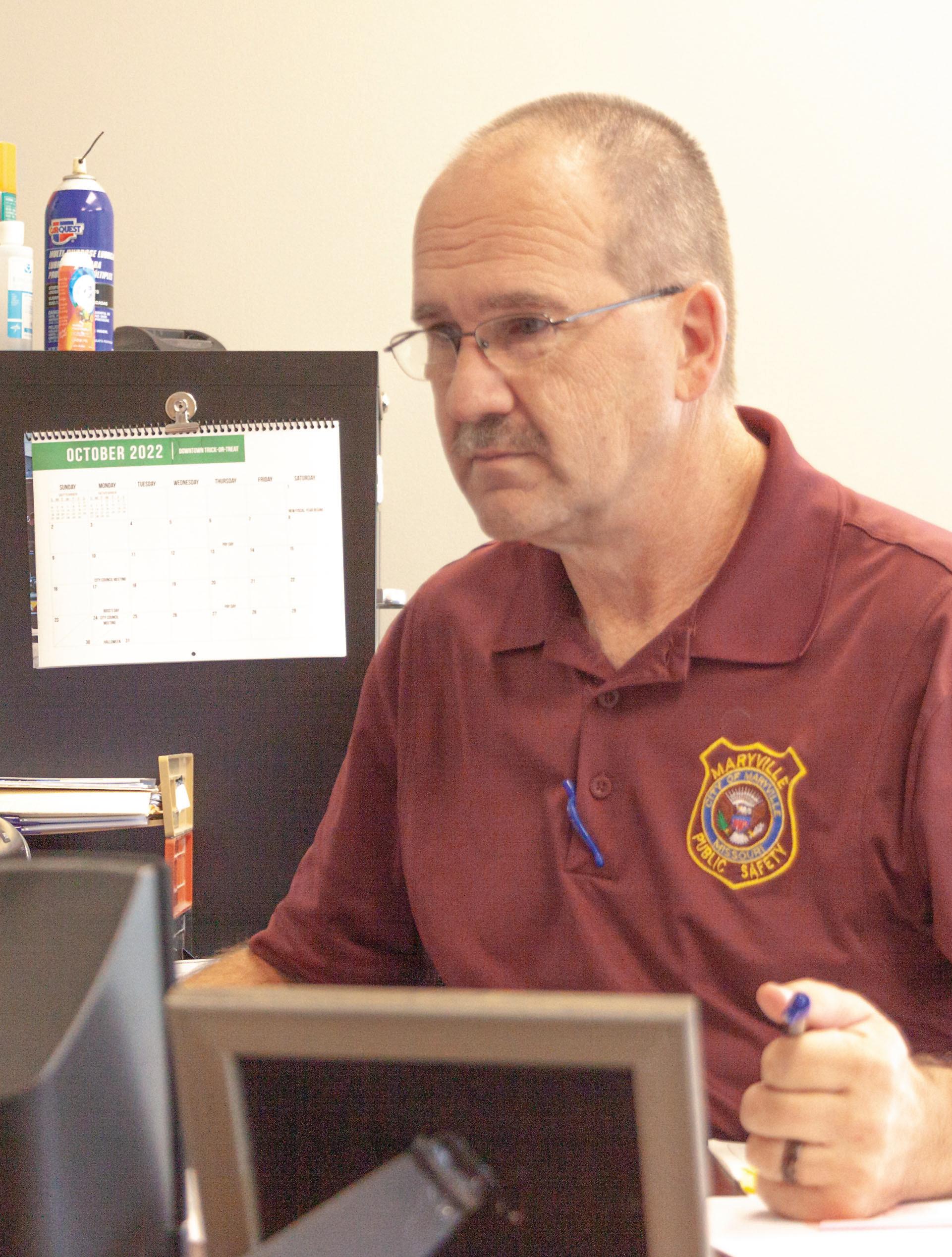
When the police receive a domestic disturbance call, a lot can go wrong. Whenever police show up to a heated domestic situation, or whether it be an abusive call or a heated argument, problems can arise. Domestic disturbance calls happen often in any jurisdiction, and according to Police Chief Ron Christian, Maryville’s jurisdiction is no different.
“I don’t know if I could give you a number, but they’re very common. I think they are in almost any jurisdiction,” Christian said. “That’s one of the calls that causes a lot of problems because of the heightened emotions going on. They’re fairly frequent, probably not everyday, but several times a week.”
On an average day, over 20,000 domestic disturbance calls are made in the United States. Domestic disturbance calls aren’t just dangerous for the abused, it can also be a potentially violent situation for the responding officers.
In 2020, the second highest cause of death was firearm-related deaths, and seven of those officers were responding to a domestic disturbance call.
Lieutenant Deputy Director Mike Stolte said a tense or violent domestic argument can be triggered easily and can escalate quickly, with any number of reasons for any kind of argument, whether it be physical or verbal.
When a domestic disturbance call comes in, Christian said the first thing the situation calls for is safety, both the officers and the couple in question. They also have to see if any children are involved or in the house and make sure that they’re taken care of. Some incidents are easier to handle than others, but when a domestic disturbance call comes in, they never know what the situation is going to be like.
“We get [domestic disturbance calls] that get kind of ugly once in a while, but fortunately the amount of people that are hospitalized or killed out of domestic abuse cases are fairly low in our community,” Christian said. “But we get into some bad sit-
uations, particularly if there’s children involved. That always makes it a lot tougher to try to figure out what’s going on, and the emotions are even higher, and it adds a complicated layer to any dynamic.”
ly. Christian said lots of stressful situations can lead to a call coming in, mainly the stress of raising children and which parent those children will live with.
For advice on how to handle such manners, Christian said from the police’s point of view of the delicate situations, saying that the worst thing an abused person can do is not reach out for help.
“The fear that some people will run into is that they’re afraid that if they say something to someone that it makes the situation worse. But we would certainly encourage them to either reach out to law enforcement or to an advocacy center,” Christian said. “We believe that getting help from an outside source somewhere is really critical. Most of these situations don’t get better on their own, so we really encourage you to reach out to law enforcement or an advocacy center of some sort.”
Christian said domestic disturbance calls are a very tough situation with no easy answers. Emotions are very complicated and hard to deal with, especially when certain issues come up, such as childcare and housing issues.
“I wish we can just give you a little check sheet. If you just follow these six steps, then everything works out great,” Christian said. “Life’s just not that easy.”
Domestic abuse is often thought of as physical abuse when more often than not, it’s something else, like verbal abuse, emotional abuse or even financial abuse. Christian mentioned the challenge that emotional abuse cases can bring into a courtroom. It’s a lot harder to gather evidence for emotional and mental abuse, whereas physical abuse can be easily proved by a black eye or a bruised torso.
Christian said there are lots of reasons why a domestic disturbance call can come in. Financial issues are a large part of them, and another common reason would be arguments over child custody. Another factor at play is substance abuse, whether it causes the fight to begin or if nobody’s thinking clear-
“Domestic violence and abuse covers a broad spectrum of whatever economic class you’re in. You can live in this mansion and still have issues, or you can live in the slums and have the same issues,” Stolte said.
Christian and Stolte said they encourage anyone who’s a victim of domestic abuse to reach out to either the police or an advocacy center.
A4 SPECIAL ISSUE Oct. 6, 2022 @TheMissourian
Police Chief Ron Christian sits at his desk in the Maryville Public Safety Office. Christian said many things can lead to a domestic disturbance call coming in, arguments over finances, child custody or substance abuse. Christian also said hospitalizations and deaths from domestic abuse are low and uncommon in Maryville.
TYSON ELLIOTT |PHOTOGRAPHER
“
Most of these situations don’t get better on their own, so we really encourage you to reach out to law enforcement or an advocacy center of some sort,”
-RON CHRISTIAN POLICE CHIEF
JAKOB PRATER News Editor | @JakobLPrater
AND BATTLING STIGMAS REMAIN ANONYMOUS. IF YOU OR SOMEONE YOU KNOW HAS EXPERIENCED VIOLENCE, PLEASE REACH OUT TO THE RESOURCES LISTED BELOW.
FROM: ANONYMOUS
I am a survivor. The word survivor can be used in many ways, but here I mean of emotional abuse and all of its repercussions, and the way it degrades a person. Also, the physical harm I caused myself.
My abuser was my boyfriend. I have known him since kindergarten. The summer before high school we started dating. He was completely different before we dated. He was charming, and I thought the jealousy was cute.
Control – he was asking more questions than my mom, to the point where I felt like I was walking on eggshells. Phone – he was always asking for my phone and asking where I was and who I was with and when I could see him, and he would show up at my house on his bike. Putting me down – he would tell me that I was ugly, and no one else would date me. He threatened my life and my family’s lives.
I reached out to my support system (mom, school counselor, advocate). I was punched in the arm, which is the reason I filed out a police report with my mom and advocate, and the school was notified. The self-harm (the cutting and putting myself down and issues of depression) happened after I left. Having to see him every day and continued controlling behavior lead to a spiral into a dark place. Now I have learned that no matter the situation, I am faced with giving up is not an option. I handled the self-harm through private counseling and help of my advocate and a teen support group that was offered at North Star Advocacy Center.




Now I am a confident young woman again who is able to share my struggle with you all. Even though I was 14 when my story started, I can say now that I’m in my mid twenties, and I am a survivor of my situation. You have to love yourself even when you feel as though you don’t deserve it. No one can change you but you.
FROM: ANONYMOUS
When asked if I wanted to share my story, I asked myself why I would do that. I hadn’tunderstood what domestic violence looked like if not a black eye. So maybe other people don’t know.
It’s not okay for another person to hurt you just because you’ve been in a relationship for a long time. I learned when things had been going good for a while, pressure would build and something not nice was going to happen. I tried to compliment him and do little things to let him know I loved him. But I could never prevent him from getting angry. Sometimes I never knew what I had done wrong. I found I couldn’t ever say no because that would spark a fight. I couldn’t make a decision without first making sure it was okay with him. I began to give in and began not to care. Good times became infrequent and only lasted a short stretch before something bad happened. I tolerated ugly behavior for years but wanted a good relationship so badly. I forgave and apologized a lot. A friend told me to stop saying I was sorry all the time and that often what had happened had nothing to do with me. Tolerating his abuse and unrepentant behavior wasn’t okay. Domestic violence isn’t okay just because other people don’t see it happening. There were long periods of time he would refuse to talk to me as punishment for something I did or didn’t do. There were times I don’t know what I did to receive his silence. For weeks I had to try to make decisions about the kids, ask other people for help and was embarrassed when I had to say I didn’t know (because he wouldn’t answer me) when asked a question that would normally involve a spouse. Those decisions I made were usually wrong, according to him, and he would further punish me by disappearing until late in the night and draining almost everything out of the checking account. I tried to pay the bills, buy groceries and let the kids do things on the money I earned. His money went for his hobbies or alcohol, and I got into trouble if I asked where his paycheck had gone. That wasn’t okay, but I felt I couldn’t say anything more. It’s not okay that he kept reminding me he could hurt me or worse . . . He let me know the guns were loaded and close by. He got in my face, cursed and said we wouldn’t be talking any further about what I wanted to talk about. I stopped most of my talking at home.
It’s not okay to frighten another person. It’s not okay when you don’t know . . . he did things to me when I slept. I was embarrassed and didn’t tell.
I kept thinking that if only I were smarter, skinnier and didn’t complain. But I realized I would never be enough for someone who was okay with hurting me.
Then I told someone what had been happening. They believed me, and there was some proof. And they helped me. I met other women that shared their story, and we cried together because what had happened to us wasn’t okay. I learned about domestic violence. It had been part of my life for a long time.
Now, I’m healing and forgiving myself. I am brave. I know freedom from domestic violence, and it is more than okay!


FROM: ANONYMOUS
I am a survivor of DV. I was with a guy who at first was everything I thought I wanted in a relationship. We did things together as a couple. He was sweet and attentive towards me, but as time went on, he became more controlling and then the physical abuse started along with the mental and emotional along with verbal abuse. He tried to set me on fire where I had to jump out of a two-story bedroom window to escape him. I suffered poly traumas that has affected my way of life. But I am ALIVE and doing good and getting stronger every day. I AM A SURVIVOR!!!!
FROM: ANONYMOUS


For years, my brain associated domestic violence with married couples where the woman was always the victim to physical abuse. All the movies and tv shows made it look this way. So it came as a surprise when someone had to sit me down and explain to me that I was a victim of domestic violence. When I was at the young age of 16, I was dating a man who I loved, who I trusted with my life. From an outsider’s perspective, he had everything that a girl wanted. He looked like he would always respect you, no matter what. I have to give him credit for putting on such a good front.
For nearly two years, my partner physically and emotionally abused me.
I had just left school and went to his house. We sat in his living room, watching a movie when the argument formed from nowhere. He had accused me of being too friendly with one of my friends, assuming that I had been cheating on him. The talking morphed into yelling and within a matter of minutes, a remote was thrown past me and into the wall. Before I could realize what had happened, a glass was shattered against the wall and I was struck with a book.
He immediately ran to me apologizing for what he had done. Telling me that he had overreacted, and that it would never happen again. I was in love, so I believed him. I wish I could say that it never happened again, but I would be lying.
For months, every little argument left me with bruises, scratches and even hand prints. I was being treated like a worn down punching bag at a boxing gym. The only difference between that and myself was each time I was hit or punched, I was manipulated either immediately or within a few hours.


He would knock my feet out from underneath me, causing me to fall to the ground. He would pin me down and scream in my face. He would grab some part of my body and drag me. He would choke me until I wasn’t able to breathe. He would slam on the breaks and watch my head slam into the dashboard. Through all of that and more, the one thing that always stayed constant — he never touched my face. If I had a bruise on my arms or legs, it just looked like an accident. In his mind, no one would say anything, it’s not on my face. He was right, no one said anything. Even if they did, it was an easy lie, “I fell.”
I don’t even think that the physical abuse was even the worst part. I could take a punch and hear the apology, it was a routine that I had gotten used to. For me, the worst of it wasn’t physical, it was emotional. And I’m not just talking about the manipulation or apologies.
At some point in our relationship, I lost every single one of my friends. I wish I was over exaggerating, but unfortunately, this was my reality. I wasn’t trusted to be with anyone else.
Any time that I wanted to do anything without him, I had to ask and that conversation would lead to either him manipulating me into staying or physical remark. Eventually, I got tired of having to do this, so I chose to not leave him.
I knew that if I continued putting up with it for any longer, I would end up dead. I was genuinely terrified for my life. I knew that if I stuck around for much longer, I was never going to recover. I didn’t know what to do or who to go to. I had lost all my friends, and my family barely saw me.
After 21 months of being with him, all of it came to an end. I still had no one, so losing him was losing the only person I had left.
I remember the feeling after just one week of being out of that relationship, I felt at ease, my bruises were near gone and I finally remembered what being happy felt like.
It took work and time to build new friendships, but more importantly, gain those old ones back. To this day, some of those friends still are unaware of why I stopped talking to them. I never quite figured out how to tell people what I had gone through, and some people didn’t believe me.
It still affects me to this day. I can’t look people in the eyes, and I have a hard time opening up about how I am feeling. I completely shut down during arguments or high tension conversations. I flinch every time someone touches me, and I don’t know how to accept a hug. But the one that I hate the most is when my right hand shakes anytime I’m scared, nervous or upset. I freak out that people are seeing the weak side of me, the vulnerable side, the one he preyed on.
I still have days that I convince myself that I overreacted, and if I would have stayed, we would’ve gotten past it and been happy or something. But most days, I think about how this man, this terrible human being, ruined me and changed my life forever.
A5 Oct. 6, 2022 @TheMissourian SPECIAL ISSUE Your first copy of the Northwest Missourian is free. Additional copies cost 25¢ each. Steven Chappell DIRECTOR MaKayla Polak Sidney Lowry Jakob Prater Kaydee Votaw Wesley Miller Dakota Weaver Sophie Williams Noah Crowe Kennedy Kalvoda Hannah Claywell River Boyd Mason Hyskell Savannah Athy-Sedbrook Cassandra Ford Alexandria Mesz Tyson Elliot Nathan Smith NEWS STAFF If you believe information within our publication is incorrect, please email us at northwestmissourian@gmail.com, call our newsroom (660) 562-1224, or leave us a comment on www.nwmissourinews.com. CORRECTIONS POLICYLETTERS TO THE EDITOR We publish letters from readers for free. All letters become the property of the Northwest Missourian, which reserves the right to edit them. Letters should include your name, address and telephone number. Letters should be between 150 and 300 words and sent to m.polak.missourian@gmail.com. Student Publications Director Editor-in-Chief Managing Editor News Editor Design Editor Sports Editor Photo Editor Copy Editor Social Media Editor Reporter/Columnist News Reporter Sports Reporter Sports Reporter Designer Designer Cartoonist Photographer Photographer Newsroom: Advertising: (660) 562-1224 (660) 562-1635 CONTACT US AD STAFF Circulation: Fax: (660) 562-1528 (660) 562-1521 Vanessa Weiler Jerilynn Hoover Sydney Cook Grace Lohman Jesse Kilcoyne Zachary McCaw Devin Jernigan Advertising Manager Ad Design Manager Advertising Designer Advertising Designer Account Executive Account Executive Account Executive EDITORIAL BOARD 800 University Drive, Wells Hall Maryville, MO, 64468 An Independent Student Newspaper since 1914. “LETTERS FROM” RESOURCES: NORTH STAR ADVOCACY CENTER 660.562.2320 WELLNESS SERVICES 660.562.1348 UNIVERSITY POLICE DEPARTMENT 660.562.1254 TITLE IX AND EQUITY 660.562.1873 MARYVILLE PUBLIC SAFETY 660.562.3209 NODAWAY COUNTY SHERIFF’S DEPARTMENT 660.582.7451 MEGHANN KOSMAN: COURT & VICTIM ADVOCATE advocate1@northstarac.org NATIONAL SUICIDE PREVENTION LIFELINE 988 THE FOLLOWING IS AN ACCOUNT FROM VICTIMS OF DOMESTIC VIOLENCE, WHICH MAY CONTAIN TRIGGERS FOR THOSE WHO HAVE EXPERIENCED SIMILAR ATROCITIES. THEIR STORIES OF SURVIVAL





















































































